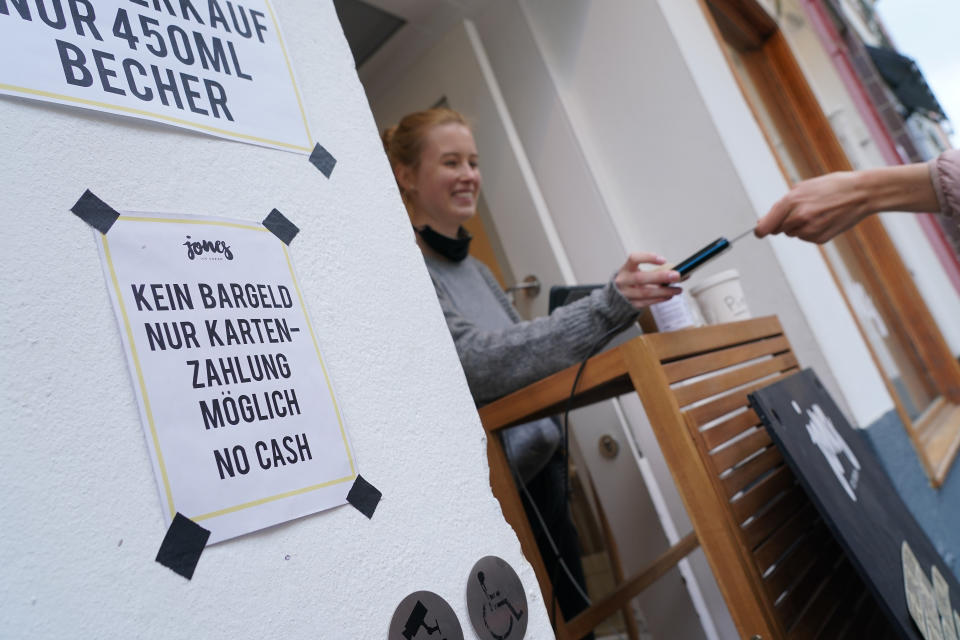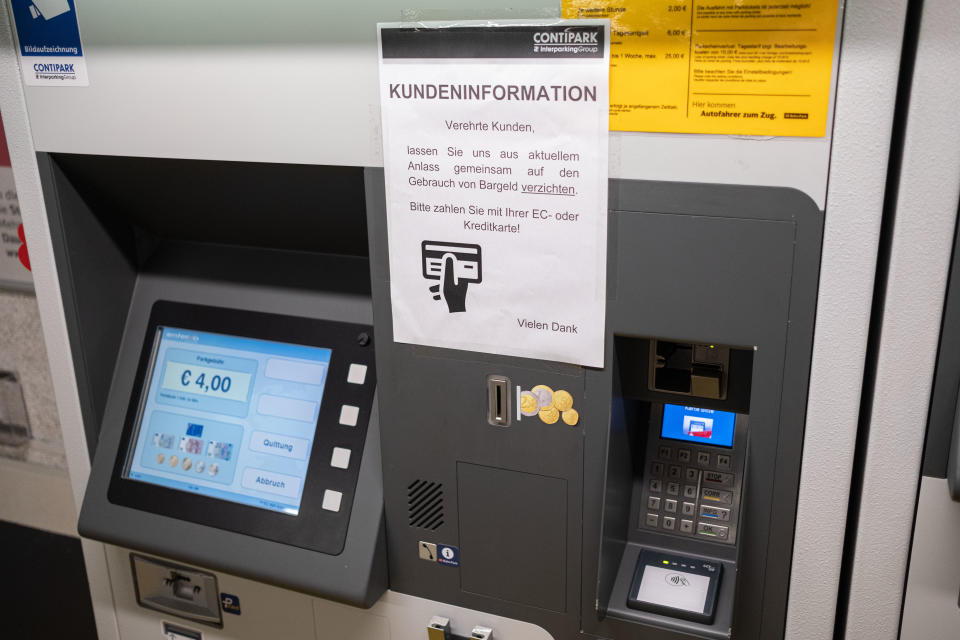Coronavirus: Pandemic pushes Germans to finally ditch cash for cards

The inhabitants of Europe’s biggest economy have long been attached to hard cash, preferring to use it for all but the largest purchases. Germany’s aversion to card payments has often frustrated tourists, who can find themselves in a predicament when a restaurant doesn’t accept cards, or thirsty because they don’t have cash for a drink from a corner store.
Germany’s fondness for cash is to a large extent rooted in its traumatic past century and multiple currency collapses. For those who lived in East Germany (German Democratic Republic), from 1949-1990, the surveillance state stoked mistrust and created a deep attachment to the anonymity that cash affords.
The country has slowly been catching up with its neighbours in terms of adopting cards to pay in supermarkets and other stores, and now the spread of the deadly coronavirus has hit fast-forward on what may prove to be a permanent shift away from cash.
As the pandemic spread, handling euros suddenly felt grubby and potentially deadly, and many smaller businesses have put up signs asking to paid via card for the first time.
In a survey of 1,475 people aged between 16 and 69, payment industry organisation Initiative Deutsche Zahlungssysteme found that 41% of them used their debit cards more often between the end of March and mid-April than before the crisis; 57% if you include credit card payments.
The majority of the card users said they did so for hygiene reasons, and out of respect for shopkeepers’ safety.
According to the German Banking Industry Committee, more than more than half of the card payments from the end of March have been contactless, compared to only 35% in December.
‘A very sudden wake-up call’

Alexander von Schirmeister, executive vice president for Europe at electronic payments company SumUp, told Yahoo Finance UK that he believes the WHO’s recommendation to transact with cards rather than cash “is just a very sudden wake-up call in a market such as Germany, for both consumers and merchants.”
London-headquartered SumUp sells card readers and connected services mainly to smaller businesses, and charges fees on card-reader transactions. Von Schirmeister says that the businesses that were able to adapt quickly to cashless payments, for example by setting up online card payments or readers at takeaway points, found themselves more resilient.
Food and grocery clients proved particularly fast to adapt once the lockdown happened, SumUp found.
“In Germany, we saw up to a 20% lift in card transactions [in one week] and we don’t think that people are suddenly buying 20% more food, it is because the share of cash in those transactions is going down and people are replacing what used to be a cash transaction with a card transaction.”
SumUp also saw a total increase of 40% more card transactions by newsstands during the four-week lockdown period, as well as a 17% increase at outdoor markets.
“It’s a chicken and egg question, where it could be consumers are coming in and saying ‘I don’t carry cash any more, and I want to transact with a card,’ and merchants increasingly noticing that in order for them to be able to respect social distancing rules, they’re better off having card acceptance,” von Schirmeister said.
Card payments outstripped cash in Germany for the first time in 2018, according to a report from the EHI Retail Institute in Cologne, with €209bn (£182bn, $226bn) spent via cards versus €208bn in cash. However, more than three quarters of the 20 billion actual transactions made that year in shops were made with physical money.
Pandemic provokes change

Gisela Bock, a retired professor of Modern History at the Free University of Berlin and long-time Berlin resident, said she has definitely used her card a lot more often since the COVID-19 outbreak.
“In my opinion, the pandemic crisis is currently playing a very large role in the change: At least for me, the question of this type of hygiene is very important — although I don't know exactly to what extent hygiene is really promoted by card payment,” Bock told Yahoo Finance UK. “I would also like to pay smaller amounts by card, and these days shops are increasingly accommodating me.”
Bock has long preferred card payments over cash, which she attributes to spending many years of her career abroad. She points to her husband, also a retired university professor, as an opposite example, as he much prefers cash, as he says it allows him a better overview of his spending.
“For me, the ‘overview’ is not as important as the greater convenience of the payment mode,” Bock says. “But I think I have to admit that I actually spend more or more spontaneous money than he does and don't always know what it was for!”
A European Central Bank (ECB) survey found that in 2016 Germans were carrying more cash in their wallets than any of the other 19 eurozone countries: an average of €103. At the other end of the scale, the French had on average €32 in their pockets and Portuguese people just €29.
Bock for one will continue paying with cards in shops when the coronavirus pandemic is over, and as a historian, she has observed how habits can change. For that change to happen in Germany, though, she said it is “crucial that the option of card payment is offered” or that the ability to choose cash or card payment is equal.
Cash still essential
“Once you start embedding a certain behavioural change, unless that behaviour change was painful or clumsy there is no reason for that to go back,” says von Schirmeister. “Yes, health considerations may have been a trigger, but hopefully we move on from health considerations and go back to the sheer fact that it is a better and more convenient way to pay.”
Fear of infection has forced Germans to dig out their debit cards, but the change will not happen overnight. The country’s central bank said that in its survey just 25% of around 1,000 respondents had changed their payment behaviour during the pandemic.
"From the current snapshot, we can only see that, even when things get serious, for example in a crisis, cash is still a very popular means of payment for everyday use," Bundesbank board member Johannes Beermann told Deutsche Presse Agentur. "We cannot see any direct effects on the medium-term payment behaviour from the current situation."
Beermann added that demand for banknotes and coins had increased at the start of the pandemic, before settling back down to the same levels as last year.
READ MORE Coronavirus marks the real beginning of the end of cash
Watch the latest videos from Yahoo UK

 Yahoo Finance
Yahoo Finance 